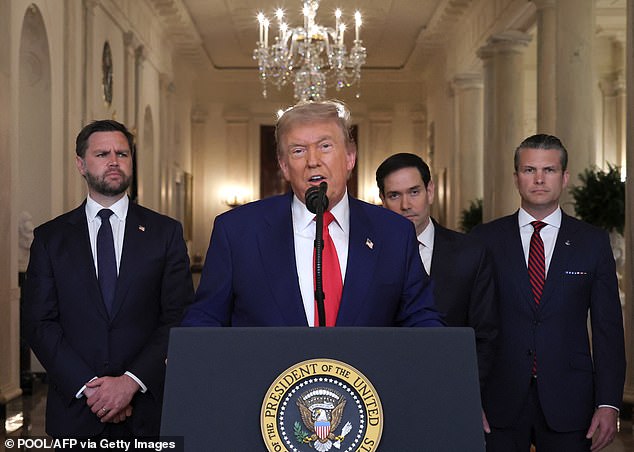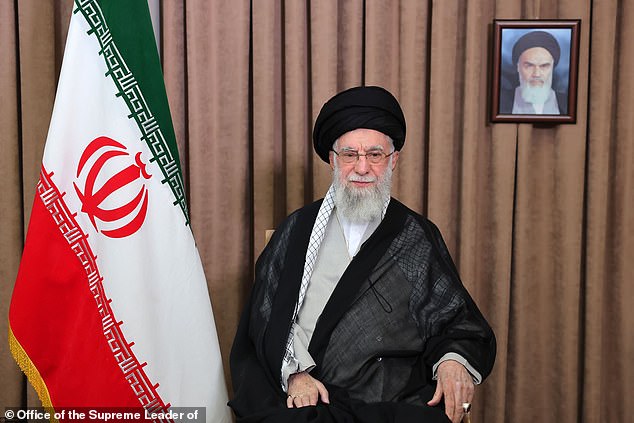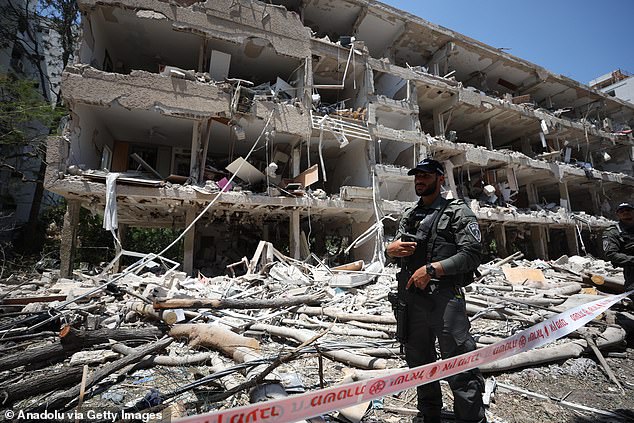Here on the frontline of Israel’s war with Iran this week, I witnessed a typically incongruous scene in the coastal city of Tel Aviv.
As Iranian ballistic missiles thudded into the cityscape behind them, sunbathers gambolled by the shore, sipped soft drinks and played racquet ball.
But there were fewer people on the beach today following the US Air Force’s surgical bombing of Tehran’s nuclear plants and the air-raid sirens shrieked with renewed intensity.
Amid the incongruity, one thing is clear: this is the most significant moment in the Middle East since the 2003 invasion of Iraq.
Last night, Donald Trump finally did what he threatened he would do – and what all his predecessors unwaveringly refused to do – and deployed his 30,000lb bunker bombs to take out Tehran’s nuclear enrichment facilities.
Make no mistake, we are in a new political reality.
The Middle East is a region that invites hyperbole, but I can say, without exaggeration, that what happened in Iran last night affects not only the region but the entire world.
The question that must now be asked, and not just by terrified civilians on both sides, but by leading strategic thinkers in America, Israel, Iran and, indeed, beyond is as simple as it is vital: What next?
In Tehran, things are dire. The Mullahs are in crisis. Their squalid regime faces the real prospect of extinction. Even during the worst days of the 1980-88 Iran-Iraq War, they never experienced the catastrophe — or the sheer indignity — of their most senior military commanders being systematically assassinated by their enemies, and their most precious defence infrastructure taken out as if it were cardboard.

Last night, Donald Trump deployed his 30,000lb bunker bombs to take out Tehran’s nuclear enrichment facilities. He is pictured announcing the strike at the White House
No one owns this disaster more than Iran’s Supreme Leader, the sadistic and calculating Ayatollah Ali Khamenei.
The nuclear programme was the radioactive jewel in his malignant web of violence. He pushed on with it in the face of international condemnation, political isolation and at a cost of somewhere in the region of half a trillion dollars.
Now, it lies in ruins. But Iran is not defeated. And it vows vengeance.
That is its default response in such circumstances, so what’s new? Necessity. Now, more than ever, Khamenei must act. And he cannot afford to take refuge in token acts of face-saving violence. That will make him look not just weak, but helpless. For a dictator that is fatal.
So what are his options? Most immediately, as I am experiencing first hand, they are striking Israel with ballistic missiles – and despite Israel’s excellent air defences, several of those missiles are getting through.
Sirens wail outside my window. Images of rocket damage swamp my social media feeds.
Iran traditionally fights via proxies. But that route is no longer the fruitful path it once was.
The Israelis decapitated Hezbollah’s leadership (almost literally as well as figuratively), with their pagers operation last year.
Hamas, meanwhile, is little more than a twitching corpse amid the devastation of Gaza. Iran’s client Bashar Al-Assad fled Syria last year and has spent the last six months enjoying Vladimir Putin’s dubious hospitality in Moscow.
But they still exist. Hezbollah is threatening to get involved. It might seem insane but if their Tehrani paymaster orders them to, it’s hard to see how they can refuse. They may get walloped again. But without Tehran they cease to exist.

Iran’s nuclear programme was the radioactive jewel in Ayatollah Ali Khamenei’s malignant web of violence. Now, it lies in ruins. But Iran is not defeated. And it vows vengeance
Iranian Foreign Minister Abbas Araghchi has not ruled out closing the Iranian-controlled Strait of Hormuz, through which 20 per cent of the world’s crude oil and 25 percent of its natural gas passes. The economic cost of such a move could be very high.
In our increasingly fraught economic times, are we ready for oil – currently standing at $77 a barrel – to rise to $100?
They could also directly attack the ‘Great Satan’, a term coined by Ayatollah Ruhollah Khomeini, the leader of the Iranian Revolution. There are dozens of US military facilities across the Middle East alone. The Iranians can also target the US navy in the region.
But, frankly, Iran has enough problems without engaging in a tit-for-tat war with the US that it cannot hope to win.
Then there is the question of the bomb. Trump called Saturday’s US air strikes on three Iranian nuclear sites a ‘spectacular military success’. The strikes ‘totally obliterated’ Iran’s nuclear enrichment facilities, he claimed.
Trump then presented Iran with a simple binary choice: ‘Make peace’ or face ‘far greater’ attacks in future.
We will need independent verification that the facilities have indeed been destroyed. Either way, what matters now is whether Iran still has stockpiles of highly enriched uranium.
The Iranians said they moved their stockpiles out of the facilities last week but, then, the Iranians say a lot of things that aren’t true. And you’d think that, given Israeli control of Iran’s skies and the proliferation of U.S. spy satellites, the anti-Tehran alliance would be aware of this if it were true.
But if Iran has managed to hide some enriched uranium – and I suspect they have – they might be able to put together a basic, even ramshackle, bomb or two.
If that’s the case, then we are about to head into a global crisis of almost Homeric drama.
The world’s biggest sponsor of terror, on its knees, but in possession of both a nuke and a colossal grievance against Israel and the West.
Here on the ground the mood is subdued. People understand the gravity of what has happened. If they are pleased, they are also wondering what happens now.
In my hotel, I pass a guest in the corridor who looks at me, then looks up at the skies, makes a missile ‘whooshing’ sound, and shrugs.
It’s a fair reaction. Not least because the Israelis and Americans are also in a tight spot (strategically if not politically).
The Israelis no doubt have a long list of regime targets they can continue to take out for several more days. But then what?
Over the past week, Israel has displayed its tactical brilliance. The June 13 operation, which hit several key Iranian nuclear and military sites, was a masterstroke of precision. Israel performs exceptionally when it ends conflicts quickly.

Despite Israel’s excellent air defences, Iran’s missiles are getting through. Pictured, a building struck by the regime’s rockets in Tel Aviv yesterday
But while Israel remains unmatched tactically, when it comes to longer-term strategy things are less clear.
The longer this drags on, the more dangerous it becomes for Jerusalem.
Yes, the Mullahs are humiliated. Yes, their nuclear programme lies in tatters – for the good of us all. And yes, a regime loathed by its people is drained of almost all internal legitimacy.
But so far, those people are not rising. The opposition is a fragmented hotchpotch of young women who protested the hijab law, coupled with students and activists. More to the point, it has no leader.
The 1979 revolution that overthrew the Shah was driven by a single figure, Ayatollah Khomeini. Contrast that with the Arab Spring: Egypt’s Tahrir Square demonstration led to the fall of the country’s president, Hosni Mubarak, but his departure left a vacuum, into which the Muslim Brotherhood stepped, followed by Egypt’s new strongman, Abdel El-Sisi.
This is what we face now in Iran. If the mullahs fell tomorrow, who would replace them?
The son of the late Shah of Iran, Reza Pahlavi, the so-called Crown Prince, who lives in a Washington DC suburb, is seen by many as a candidate. But I’ve met him and I think he’d struggle to run a school parents’ evening let alone Iran.
So for now, all options remain open. Israel continues to hammer Iranian military targets, while Iran launches waves of missiles at Israeli cities.
Now, more than ever, Israel needs strategic wisdom to go alongside its stunning military capabilities. It fought Iran, not just for itself, but for all of us. It must finish the job with that same responsibility in mind.












